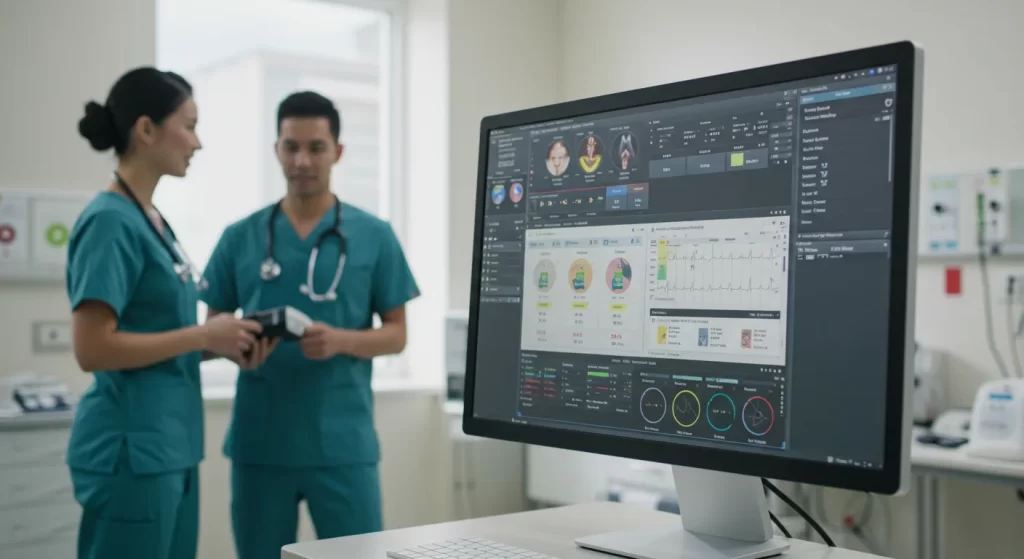Choosing the right Electronic Health Record (EHR) system is one of the most critical decisions for any healthcare organization. The EHR is the digital backbone of modern patient care, clinical operations, and financial management. Two of the most prominent names in the EHR landscape are Allscripts and Epic.

This blog post provides an in-depth comparison of Allscripts vs Epic, examining their flagship products like Allscripts Sunrise vs Epic solutions, company structures, core capabilities, target markets, technological advancements, and market standing. Understanding the nuances between Epic vs Allscripts is crucial for making an informed investment that aligns with your specific needs and future goals.
Looking to adopt cutting-edge EHR within your healthcare system? SPsoft has deep expertise in developing and integrating robust EHR platforms!
Allscripts vs Epic – Key Differentiators
Before diving into a detailed analysis, this table offers a high-level comparison of Allscripts (now largely operating as Altera Digital Health for its hospital solutions and Veradigm for ambulatory and data analytics) and Epic Systems. This snapshot highlights core differences and similarities, setting the stage for a deeper exploration of the Allscripts vs Epic debate.
| Characteristic | Allscripts (Altera Digital Health / Veradigm) | Epic Systems |
|---|---|---|
| Primary Target Market | Altera Sunrise: Large hospitals/health systems. Veradigm Pro: Small-to-medium practices. | Large health systems, academic medical centers; Community Connect for smaller entities. |
| Flagship EHR(s) | Altera: Sunrise, Paragon, TouchWorks EHR. Veradigm: Veradigm EHR, Practice Fusion. | EpicCare (suite), MyChart (patient portal). |
| Core Strength | Modularity, specific solutions for varied needs (e.g., Altera for large systems, Veradigm for ambulatory). | Comprehensive integrated platform, strong interoperability within its vast network. |
| General Cost Perception | Varies; Veradigm can be competitive for smaller segments. Altera Sunrise is a significant investment for large systems. | Generally higher, representing a significant upfront and ongoing investment. |
| Interoperability Approach | Altera: dbMotion solution for data aggregation. Veradigm: Focus on data exchange. | Care Everywhere, Happy Together, extensive network participation, TEFCA. |
| AI Focus | Allscripts/Veradigm: Predictive scheduling, analytics. Altera: Exploring AI for nursing, ambient listening with partners. | Generative AI, clinical decision support, operational AI, ambient AI, conversational AI. |
Company Profiles: Understanding the EHR Giants
To truly understand the Allscripts vs Epic dynamic, it’s essential to look at the companies themselves — their histories, philosophies, and recent transformations.
Allscripts (Altera Digital Health & Veradigm)
Founded in 1986, Allscripts grew to become a significant name in healthcare IT. However, the “Allscripts” of today is different due to a major structural change. In March 2022, Allscripts sold its hospital and large physician practice business segment — which includes key EHR solutions like Sunrise, Paragon, TouchWorks EHR, and the dbMotion interoperability platform — to N. Harris Computer Corporation. Harris rebranded this acquired segment as Altera Digital Health. The remaining Allscripts entity subsequently rebranded as Veradigm, focusing on its data, analytics, payer, and life sciences businesses, as well as its ambulatory EHR solutions.
This split is a critical factor for any organization evaluating “Allscripts.” The product you are considering will determine whether your relationship is with Altera Digital Health or Veradigm. This distinction impacts product roadmaps, target markets, and potentially the overall vendor relationship.
- Altera Digital Health. Now the custodian of the traditional Allscripts hospital and large practice EHRs, Altera Digital Health aims to provide a “forever home” for these solutions. Their portfolio is geared towards hospitals and larger physician groups, emphasizing the continuity and development of products like Altera Sunrise (a comprehensive EHR for large enterprises), Altera TouchWorks EHR (for large, multi-specialty practices), and Altera Paragon (for smaller hospitals).
- Veradigm. This entity focuses on leveraging data and analytics, connecting life sciences, payers, and providers. Its EHR offerings are primarily for the ambulatory space, including Veradigm EHR (formerly Allscripts Professional EHR for small to medium practices) and Practice Fusion by Veradigm (a cloud-based EHR for independent practices).
Epic Systems
Epic Systems was founded in 1979 by Judith Faulkner and is headquartered in Verona, Wisconsin. It is a privately held company with a deeply ingrained philosophy of in-house development and a notable absence of acquisitions to grow its product line. This approach has fostered a highly integrated and cohesive software suite.
Epic holds a commanding market share, particularly in the United States. As of 2022, hospitals using its software held medical records for an astounding 78% of patients in the U.S. and over 3% of patients worldwide. The company’s core EHR philosophy revolves around its Chronicles database management system, which supports a single, longitudinal patient record across all care settings.
A significant aspect of Epic’s strategy is its substantial reinvestment in research and development, dedicating approximately 35% of its operating expenses to R&D. This private ownership and focus on organic growth allows Epic to pursue a consistent, long-term vision for its products. This model contrasts with the journey of Allscripts, which involved numerous acquisitions followed by the recent major divestiture. For healthcare organizations, this difference in company structure and strategy can be a vital consideration when weighing Epic vs Allscripts.
A Feature-by-Feature Look at Allscripts Sunrise vs Epic
When comparing large enterprise solutions, the Allscripts Sunrise vs Epic matchup is central. Both platforms offer a vast array of features designed to manage complex healthcare environments.

- Clinical Workflow and Documentation. Altera Sunrise is engineered to support physician decision-making by providing aggregated patient information, tools for documentation, and real-time data entry. Key features include a decision support engine, integrated medication management, and customizable templates. Epic’s system is built to streamline overall patient care by tightly integrating scheduling, clinical documentation, and billing into one unified system. It centralizes patient data and offers features like “Dot phrases” and AI-powered charting to reduce documentation burden.
- Patient Record Management. A core tenet of Altera Sunrise is providing a single clinical and financial patient record spanning acute and ambulatory care. Epic’s Chronicles database serves as the foundation for its longitudinal patient record, designed to capture a patient’s entire health story.
- Order Entry (CPOE) and Management. Altera Sunrise features Computerized Physician Order Entry (CPOE) to reduce errors and streamline workflows, with integrated medication management. Epic provides robust electronic order entry for tests, medications, and other treatments, including e-prescribing functionality.
- Specialty-Specific Functionality. Both Altera Sunrise and Epic offer functionalities tailored to various medical specialties. Epic’s model often involves specialty steering boards of practicing clinicians guiding module development. Altera also highlights specific modules for Sunrise, such as those for Ambulatory Care, Oncology, and Surgical Care. The depth and utility of these specialized modules are often key differentiators.
Who Uses Allscripts and Who Uses Epic?
The choice between Allscripts vs Epic often comes down to the size and type of the healthcare organization.

- Allscripts/Altera’s Diverse Market Segments. Altera Sunrise is primarily aimed at large hospitals, complex health systems, and academic medical centers. Altera Paragon is positioned for smaller health networks and community hospitals. Veradigm solutions like Veradigm EHR and Practice Fusion focus on the ambulatory sector, particularly small to mid-sized physician practices.
- Epic’s Dominance in Large Systems and Outreach to Smaller Entities. Epic’s core market has traditionally been large, complex healthcare organizations. To extend its reach, Epic established the Community Connect program, allowing smaller, independent hospitals and physician practices to utilize the Epic EHR system of a larger, nearby host organization. This is a key strategy for Epic to serve smaller entities without developing a separate “lite” version of its software.
- Analyzing “Epic vs Allscripts” Suitability. For large health systems, Epic is frequently the preferred choice due to its comprehensive, integrated platform. Altera Sunrise also competes in this segment. For smaller clinics, Veradigm’s products are tailored to their needs. Epic’s Community Connect is an option for smaller entities affiliated with a larger Epic host. Recent KLAS Research data from 2024 shows Epic was chosen by nearly 70% of all hospitals making EHR decisions.
Interoperability and Integration: Connecting the Dots
Seamless data exchange is paramount. Both Allscripts vs Epic have invested significantly in interoperability.
Comparing Interoperability Levels
Altera’s dbMotion solution aggregates, harmonizes, and visualizes patient data from diverse EHR systems. Epic is widely recognized as a leader with its Care Everywhere platform and Happy Together feature in MyChart, facilitating massive daily record exchanges. Independent assessments by KLAS Research have indicated strong performance by Epic in achieving deep interoperability.
Epic’s extensive market share creates a powerful network effect. While both systems support industry standards, “Epic-to-Epic” exchanges are common and seamless.
FHIR and HL7 Standards
Both vendors support FHIR (Fast Healthcare Interoperability Resources). Allscripts/Altera’s FHIR API supports FHIR R4 and US Core guidelines. Epic also provides robust support for FHIR APIs, enabling standardized access for third-party applications. The commitment to FHIR is crucial for a connected healthcare ecosystem.
Third-Party System Integration
Allscripts/Altera has historically promoted an “Open, Connected Community of Health,” and Altera continues to emphasize an open architecture. The Allscripts Developer Program (now Veradigm Connect for Veradigm solutions) provides APIs. Epic’s approach is largely managed through its App Orchard program (now Epic App Market/Showroom), a marketplace for pre-approved third-party applications.
While Allscripts/Altera highlights its “open” philosophy, Epic’s App Orchard has gained significant traction. The critical factor is whether specific needed integrations are available, robust, and well-supported.
Patient Engagement: Portals and Tools
Empowering patients is a key goal, and EHRs play a vital role through patient portals.
Patient Portal Comparison
Veradigm’s FollowMyHealth is a comprehensive patient engagement platform integrating scheduling, secure messaging, bill payment, and personal health record access. It features telehealth integration and extensive language support. Epic’s MyChart is one of the most widely used patient portals, offering access to medical records, lab results, appointment scheduling, secure communication, medication management, and telehealth. Unique MyChart features include “Happy Together” (consolidated records) and “Share Everywhere” (temporary record access for any provider).
Overall Patient Engagement Strategies in “Allscripts vs Epic”
Allscripts/Veradigm centers on FollowMyHealth, emphasizing accessibility and a wide range of functionalities. Epic’s MyChart is the cornerstone of its strategy, deeply embedded and focused on extensive self-service capabilities. Epic’s MyChart benefits from widespread adoption, making network-leveraging features particularly powerful. FollowMyHealth stands out with its complex feature set and strong language support.
Clinical Decision Support (CDS): Aiding Better Outcomes
Effective CDS tools improve patient safety and quality of care.
- CDS Capabilities in Allscripts/Altera Sunrise. Altera’s Sunrise Clinical Manager incorporates a decision support engine. For other Allscripts products, integration with third-party CDS solutions like Infera CDSS is key. Infera CDSS analyzes patient data in real-time against evidence-based rules. Veradigm EHR also provides HCC alerts and calculates RAF scores.
- Epic’s CDS Tools. Epic has deeply integrated CDS tools. BestPractice Advisories (BPAs) are alerts and reminders to improve safety and guideline adherence. Epic provides SlicerDicer, a self-service reporting tool, to analyze CDS effectiveness. The platform includes robust tools for population health management. Epic’s approach is often guided by the “CDS five rights” framework (right information, right people, right formats, right channels, right workflow points).
Epic’s CDS appears more deeply embedded and configurable. Allscripts/Altera relies on Sunrise’s native engine and third-party integrations.
The Innovation Frontier: Telehealth and AI
Telehealth and Artificial Intelligence (AI) are transforming healthcare. Both Epic vs Allscripts are incorporating these technologies.
Telehealth Features
Veradigm’s FollowMyHealth and Veradigm EHR offer integrated telehealth, including video visits. Allscripts solutions generally support video consultations and virtual follow-ups. Epic’s telehealth is deeply integrated, allowing remote patient monitoring, medication management, and patient history access during video visits via MyChart. Epic has also integrated with platforms like Microsoft Teams. Industry analysis suggests Epic offers a more fully integrated telehealth experience.
AI Integration: Current Capabilities and Future Directions
Veradigm EHR uses AI for its Predictive Scheduler. Allscripts EHRs have incorporated AI to optimize search. Altera’s Sunrise EHR integrates with tools like Microsoft Power BI, and Altera is exploring AI for nursing support and offers ambient listening in Paragon Denali through a partnership.
Epic is making a significant push into AI, particularly generative AI, with its “Epic Launchpad” initiative. Key applications include AI assistants for drafting notes, conversational AI for patient scheduling, predictive healthcare models, and AI-enhanced diagnostics. Epic is partnering with tech leaders like Microsoft and NVIDIA and co-developing ambient AI with vendors like Nuance and Abridge.
Epic appears to be investing more broadly and deeply in embedding cutting-edge AI.
Usability and Clinician Experience: The Human Factor
The usability of Epic vs Allscripts systems impacts efficiency and satisfaction.
Comparing Clinician Experiences
Veradigm’s EHR solutions are often praised for user-friendliness in smaller practices. Altera Sunrise for larger hospitals has received mixed usability reviews, with some praising simplicity in specific contexts but others citing slow speeds and navigation difficulties. Epic generally garners high physician satisfaction, with users finding it well-structured once familiar. However, its comprehensiveness can lead to complexity, with critiques of “too many clicks.” A 2023 ABFM physician survey found Epic and athenahealth rated significantly higher in usability than Allscripts.
Learning Curve and Training Requirements
Veradigm EHR is often cited for quick adaptation. Altera Digital Health offers various training services, but the volume of features can present a steep learning curve. Epic training is critical and often extensive, with durations from days to weeks depending on user role and modules.
Impact on Physician Burnout
EHRs can contribute to burnout. The 2023 ABFM survey showed Allscripts users among the least likely to be “very satisfied,” while Epic users were more likely to report being “very satisfied.” Epic is actively developing features to reduce administrative load. KLAS Arch Collaborative insights show training quality is highly correlated with EHR satisfaction.
Accessibility: Mobile and Cloud Strategies
Access via mobile devices and cloud platforms is critical.
Mobile App Functionality
Veradigm EHR Mobile allows schedule and message checking. Altera’s Sunrise EHR offers native mobile apps. Veradigm’s FollowMyHealth is mobile-first. Epic provides Haiku (smartphones), Canto (tablets), and Rover (nursing), with MyChart being highly mobile-friendly. A critique is that some Epic desktop features may not be fully functional on mobile.
Cloud Deployment
A key strategy for Altera is the cloudification of Sunrise EHR on Microsoft Azure for scalability and security. Veradigm EHR and Practice Fusion are also cloud-based or cloud-native. Epic offers cloud solutions and assists clients in migrating to AWS, Azure, and GCP. Historically, Epic is known for large on-premise deployments, though cloud hosting is increasingly adopted.
Altera has a clear strategic commitment to Azure for Sunrise. Epic supports cloud hosting but has a legacy in on-premise deployments. The trend for both is towards the cloud.
Customization and Future-Proofing
Tailoring an EHR and adapting to future demands is crucial.
Customization Capabilities of Allscripts/Altera Sunrise and Epic
Allscripts/Altera Sunrise offers customizable templates. Veradigm EHR features editable templates. The open architecture of Allscripts/Altera solutions is often cited for enabling customization. Epic is renowned for being highly configurable, offering “SmartTools” (SmartTexts, SmartPhrases, SmartLinks, SmartForms), customizable BPAs, and tailorable modules. However, Epic’s high degree of customization can be complex and costly.
Flexibility and Adaptability for Future Healthcare Demands
Altera’s alliance with Microsoft for a cloud-based Sunrise EHR on Azure is key to its future-proofing, emphasizing openness and interoperability. Epic’s commitment is shown by substantial R&D investment and expansion into ERP, life sciences, and advanced AI and genomics.
Both are working to be adaptable. Epic’s strategy appears broader, aiming for a comprehensive intelligent health platform. Altera’s Sunrise strategy is tied to Azure, focusing on a modern, cloud-native EHR.
Cost, Implementation, and ROI in the Allscripts vs Epic Debate
Financial considerations are paramount in the Allscripts vs Epic cost discussion.

Pricing Models: Is Epic more expensive than Allscripts?
Direct cost comparisons are challenging due to custom pricing. Veradigm solutions offer lower entry points; Allscripts Professional EHR (now Veradigm EHR) quoted around $299/provider/month, Practice Fusion at $149/provider/month. Altera Sunrise implementation can range from $500,000 to over $8 million for large systems.
Epic’s pricing is highly customized. Self-hosted options can range from $1,200 for small clinics to over $500,000 for larger hospitals (base software). Subscription models might be around $200/user/month for small clinics, exceeding $35,000/month for large deployments. Large-scale Epic implementations are notoriously expensive, potentially costing hundreds of millions.
Generally, Epic is perceived as more expensive for large implementations. Altera Sunrise also represents a multi-million dollar investment for large hospitals. For smaller practices, Veradigm offers more affordable price points.
Hidden Costs of Implementation
Initial fees are just the start. Both Allscripts/Altera and Epic implementations involve numerous other “hidden” costs:
- Staff Training. Major expense, initial and ongoing.
- Data Migration. Complex and costly.
- Customization. Tailoring workflows, templates, reports.
- Hardware/Infrastructure Upgrades. Especially for on-premises.
- Third-Party Integration Fees. Connecting to other systems.
- Ongoing Maintenance/Support. Typically annual fees.
- Productivity Loss. Temporary dip during transition.
- Project Management/Consulting Fees. External or internal resources.
- Compliance/Security Upgrades. Meeting regulatory requirements.
These can substantially increase the Total Cost of Ownership (TCO).
ROI Considerations for Different Settings, Especially Mid-Sized Hospitals
True ROI comes from strategically leveraging the EHR to improve clinical outcomes, optimize resources, and enhance financial performance. Productivity may dip in the first one to two years. Altera Sunrise is designed for midsize and larger hospitals, aiming to streamline billing, automate documentation, and improve efficiency. Epic is also used by mid-sized hospitals, with ROI drivers including improved care quality, streamlined workflows, and reduced operational costs. For mid-sized hospitals, ROI depends on effectively leveraging the chosen system. Epic’s higher TCO may require more significant efficiency gains.
This table provides general estimates; actual costs vary significantly.
| Organization Size | Allscripts/Altera (Relevant Product) | Epic Systems |
|---|---|---|
| Small Clinic/Practice (e.g., 1-10 providers) | Veradigm Pro: ~$299/provider/mo + Impl. $5k-$50k. Practice Fusion: ~$149/provider/mo. | Basic Subscription: ~$200/user/mo. Initial Setup: $100k-$300k. |
| Mid-Sized Hospital/Practice (e.g., 50-200 beds / 11-50 providers) | Altera Sunrise/Paragon Impl: $100k-$400k (11-50 providers); $500k-$3M (100-500 beds). | Initial Setup (4-10 providers): $300k-$700k. Larger mid-size implementations can run into several millions. |
| Large Health System (e.g., 500+ beds) | Altera Sunrise Impl: $3M-$8M+; Annual Maint: $800k-$1.5M+. | Initial Setup: $10M-$30M+ (can be hundreds of millions); Annual Maint: $1.5M-$3M+. |
Security and Compliance: Safeguarding Patient Data
Protecting patient health information (PHI) is non-negotiable.
Security Features and HIPAA Compliance
Allscripts/Altera Sunrise employs advanced authentication, access controls, data encryption, and audit logs. For cloud-hosted Sunrise on Azure, it leverages Azure’s security. Altera Sunrise Suite holds ISO 9001:2015 recertification. Epic Systems implements a multi-layered security strategy with end-to-end encryption, strict access controls, and comprehensive audit trails. Epic’s EHR is designed to be HIPAA compliant and has ONC-ATCB certification.
Handling of Regulatory Standards
Both vendors state their commitment to helping organizations meet HIPAA and undergo ONC certification.
Relevant Certifications and Data Breach History
Altera’s Sunrise Suite holds ISO 9001:2015. Various Allscripts products carry SOC 2, EHNAC, and EPCS certifications. A significant ransomware attack hit Allscripts’ cloud-based Professional EHR in January 2018, impacting ~1,500 organizations. No major direct data breaches of Epic’s core EHR systems were found in the research, though a dispute with Particle Health regarding data access via Carequality was noted (not a breach of Epic’s systems). The 2018 Allscripts incident underscores the importance of robust vendor security and client business continuity plans.
Market and Strategic Outlook: The Future of Allscripts vs Epic
The EHR market is dynamic. The Allscripts vs Epic comparison reveals distinct trajectories.
Current Market Share
- Acute Care Hospital Market (U.S.). Epic is dominant, with KLAS Research reporting its market share between 37.7% and 42.3% of hospitals for 2024/2025, commanding over 54.9% of inpatient beds. Altera Digital Health holds a smaller share, around 3.0% to 3.4%.
- Ambulatory EHR Market (U.S.). Epic also has a strong position, with estimates from 33.4% to 43.92%. Veradigm has a smaller share, around 3.6%.
| Market Segment | Epic Systems (% share) | Altera Digital Health (% share) | Veradigm (% share) |
|---|---|---|---|
| US Acute Care Hospitals | 42.3% | 3.0% | N/A |
| US Acute Care Beds | 54.9% | 3.0% | N/A |
| US Ambulatory EHR | ~33-44% | N/A | ~3.6% |
Innovation Roadmaps and Strategic Directions
Altera’s strategy for Sunrise is focused on cloud-native capabilities with Microsoft Azure, emphasizing quality, reliability, and supporting national digital health initiatives like the UK’s NHS. Veradigm concentrates on integrated data systems for payers, life sciences, and providers.
Epic’s direction is characterized by massive R&D investment and expansion into AI, genomics, life sciences research, clinical trials management, and ERP solutions. Epic is a strong proponent of national interoperability frameworks. Gartner’s 2025 healthcare IT outlook emphasizes AI, core system modernization, and cybersecurity.
Epic’s outlook appears exceptionally broad. Altera’s Sunrise strategy is tied to Azure. The future of Allscripts vs Epic competition will depend on Altera’s execution with Sunrise and Epic’s continued expansion.
Conclusion
The Allscripts vs Epic decision is significant. There’s no single “best” EHR; the optimal choice depends on context, needs, size, budget, and strategy.
Epic is dominant for large, complex systems, offering a comprehensive, integrated platform with strong interoperability and innovation, albeit at a high cost.
The “Allscripts” landscape is nuanced. Altera Digital Health’s Sunrise targets large hospitals with a cloud-native Azure approach. For these, Allscripts Sunrise vs Epic is a key comparison. Veradigm caters to ambulatory practices with more user-friendly and cost-effective solutions, focusing on data analytics.
Organizations must conduct thorough due diligence: define requirements, see demos, speak with peers, analyze TCO, and evaluate vendor partnership. The Epic vs Allscripts choice is about selecting a long-term strategic partner.
Ready to optimize your EHR strategy and explore how AI can improve your patient care and operational efficiency? The experts at SPsoft are here to help! Contact us today!
FAQ
Allscripts or Epic: Which is better for a large hospital versus a small clinic?
For large hospitals, Epic is generally favored; Altera Sunrise also targets this segment. For small clinics, Veradigm EHR or Practice Fusion are more tailored. Epic’s Community Connect is an option for affiliated smaller clinics.
Who leads in EHR interoperability and data sharing?
Epic is widely considered the leader due to its Care Everywhere network and large market penetration. Altera’s dbMotion is also a robust platform.
Allscripts’ FollowMyHealth vs Epic’s MyChart – What’s the difference?
Epic’s MyChart benefits from its vast network (Happy Together). Veradigm’s FollowMyHealth stands out for telehealth integration and language support.
Is Allscripts or Epic more advanced in AI and telehealth tools?
Epic is making more extensive investments in generative AI. Allscripts/Altera/Veradigm use AI for predictive scheduling and search; Altera’s Paragon offers ambient listening via partnership. Epic is generally seen as having more integrated telehealth.
Which EHR is easier for doctors and nurses to use?
Subjective. Veradigm’s ambulatory products are often praised. Epic, if well-customized and supported by training, can be efficient. Altera Sunrise has mixed usability reviews.
Is Epic really more expensive than Allscripts? What are the hidden fees?
Generally, Epic’s TCO for large systems is higher. Altera Sunrise is also a significant investment. Veradigm’s solutions are more affordable for smaller practices. Hidden costs for any major EHR (training, data migration, customization, maintenance) are substantial.
Allscripts Sunrise vs Epic – Which is more flexible for tomorrow’s healthcare?
Epic invests heavily in R&D and platform expansion (AI, genomics, ERP). Altera focuses Sunrise on a cloud-native Azure strategy and open architecture.
How do Allscripts and Epic protect patient data and ensure HIPAA compliance?
Both have robust security (encryption, access controls, audit trails) and are designed for HIPAA compliance. Allscripts had a ransomware incident in 2018.



